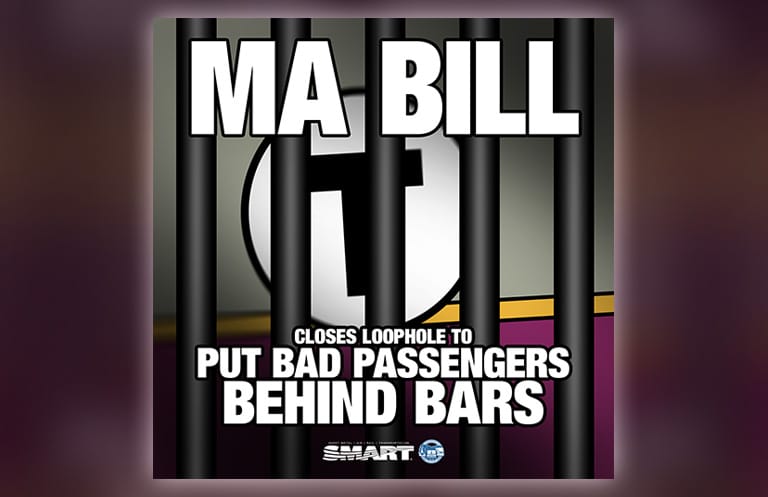
The law in Massachusetts is clear: assault a public transit worker, and you go to jail — up to 120 days or a maximum $5000 fine. Except, in many cases, public transit is operated by private companies.
Boston’s Keolis, which employs 426 SMART-TD members, is one such company. This means that our members endure the regular threat of assault without relief.
Cole Czub, Vice Chairman of SMART-TD’s Bus and Transit Assault Prevention and Safety (BTAPS) Committee, explains that a new bill is in the works to fix that.
“We see nationwide assaults are on the rise for all transportation workers,” Czub explained. “Every one of our people deserves to be able to go home at the end of the day the same way they showed up. This will, at the very least, put some repercussions on the people that would prevent this from happening. It’s not okay to lay your hands on or assault anybody who works anywhere, but especially in transit.”
SMART-TD’s New England Safety and Legislative Director Dave Stevenson described how a major, unintended loophole in the current law could allow some offenders to walk free.
“We’re technically not public employees,” Stevenson noted. “When a lot of guys get assaulted, they still charge the assailant with assault on a public employee. If you have a half-decent lawyer, you could easily get that thrown out in court.”
As a real-world example, Czub recalled an incident from last year when a worker ended up in the hospital, but the offender is still allowed to ride the train.
“Unless an officer sees it happen, it’s considered simple assault, and they get a summons to court. This [the legislation] will fix that.”
New bill to protect Boston’s SMART-TD bus and transit members
House Docket No. 2682 will broaden the definition of “public employee” to cover transit workers employed by private companies, a group that wasn’t included in the original legislation.
The measure also adds “bodily fluids” to the definition of an assault, which imposes strong incentives for passengers to avoid getting their spit or urine on our members. It wouldn’t be in the bill if this didn’t happen often enough to be a real problem.
Czub pointed out that other labor organizations have been trying to pass this legislation for several years, but it always seems to get pushed aside. He’s confident that SMART-TD’s involvement will be the extra momentum that’s needed to get this over the finish line.
“It’s just been an oversight that’s been allowed to exist for far too long, and it’s definitely time to put a fix to it,” Czub said. “I think we have the support and the support in the Massachusetts government to get it done.”
A Hopeful Path to Passage
Once committees are formed within the next couple of weeks, supporters will have a better sense of the legislation’s path to becoming Massachusetts law.
After that, Stevenson is preparing for an all-hands-on-deck effort.
“We’re going to use every tool we have to get this passed,” Stevenson promised. “We’ll let our members know to reach out to their legislators to support the bill. Testify in person. Testify in writing. We’re going to get our members mobilized and hopefully push this bill in the right direction.”
The message to lawmakers is simple but powerful.
“I just want to make sure that they hear us loud and clear that this has to get done now,” Czub said.
Related News
- Kansas funds passenger rail expansion
- SMART’s General President Defends Our Brother
- Maryland Passes Monumental Transit Safety Bill
- Brother Wirth Crowned Champion in 168-Pound Masters Division Victory
- Chairman Pauli Announces Retirement, SMART-TD celebrates his career
- SMART statement on Supreme Court’s decision regarding Kilmar Armando Abrego Garcia’s return to the United States
- SMART-TD Stands With Brother Kilmar Abrego Garcia
- New Mexico Local 1687 sets new precedent with Red Apple Transit
- Tentative Agreement Reached With TransitAmerica Services (TASI)
- SMART issues Monday, April 7, statement on Kilmar Armando Abrego Garcia’s ongoing case